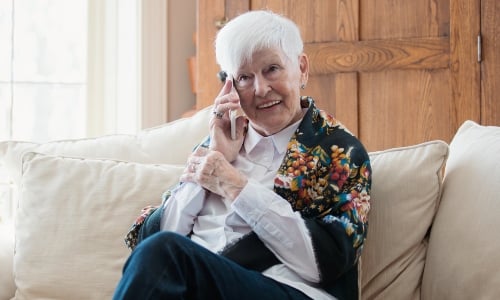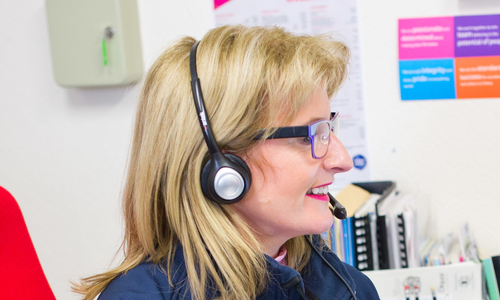As anyone who volunteers or works for Age UK’s Silver Line Helpline knows, no two calls are ever the same.
 The free, national service is available 24 hours a day, every day of the year, and so the conversations we have can vary with the seasons, the months, and the time of day. Some people might call for a friendly chat in the evening, because they haven’t spoken to anyone else for hours. Others call in the middle of the night, desperately needing to discuss the concerns that are keeping them awake. And then are those who prefer to call in the morning, simply because they want someone to know that they’re still here.
The free, national service is available 24 hours a day, every day of the year, and so the conversations we have can vary with the seasons, the months, and the time of day. Some people might call for a friendly chat in the evening, because they haven’t spoken to anyone else for hours. Others call in the middle of the night, desperately needing to discuss the concerns that are keeping them awake. And then are those who prefer to call in the morning, simply because they want someone to know that they’re still here.
But whatever reason an older person has for calling The Silver Line Helpline, there’s always a volunteer or helpline officer on hand to listen. And for an older person who’s feeling alone, knowing that someone is listening can make all the difference.
Finding connections
For many people who call The Silver Line, loneliness is a daily struggle. People like Emily*, who lives alone and felt increasingly isolated following the death of her husband. In a bid to find some company and conversation, Emily started travelling around on the bus, and she soon befriended someone who worked in a local shop.
But as Emily visited the shop more frequently, her new acquaintance told her she’d have to stop. Although they seemed sad to say it, Emily’s visits were affecting their ability to work. Emily felt rejected and upset; after finally finding someone to talk to, that connection had been snatched away.
Thankfully, Emily discovered The Silver Line Helpline soon afterwards, and she now calls for regular chats. Whoever she speaks to, Emily loves that they always sound happy to hear from her.
Like Emily, Betty* found that losing her husband left her feeling desperately alone – and anxious, too. At night, when Betty struggles to sleep, she calls us to share stories about the man she was devoted to for 30 years. For her, these calls are a way of keeping her husband’s memory alive.
But for others who call, it’s the stories they hear rather than the stories they tell that help to ease the loneliness. Thomas*, who has called The Silver Line Helpline regularly for the last few years, doesn’t like to talk about himself. Instead, he prefers to hear all about the lives of the people he speaks to. He says that the calls have made an enormous difference to his life because he lives on his own, and hearing about other people’s experiences is a way to distract himself from his own reality.
Confidential support
Our volunteers and helpline officers can also provide callers with someone to unburden to during challenging times. Rebecca*, who has been involved in a romance scam, has found this aspect of The Silver Line Helpline particularly helpful.

After joining Facebook so she could engage with posts from her favourite tennis players, Rebecca was approached by an account posing as a younger man. After some time spent asking questions about her life and flattering her, Rebecca’s new connection scammed her out of thousands of pounds.
The experience left Rebecca feeling embarrassed and ashamed, and she felt unable to talk to her family about the incident. Instead, she turned to The Silver Line Helpline. The anonymity of the calls has given Rebecca the chance to openly discuss the situation in a way that she wouldn’t have felt comfortable doing otherwise. Rebecca wasn't looking for any practical help or support, she just wanted to share how she was feeling.
Chats with The Silver Line Helpline have also helped Karen* to find comfort and support. Karen cares full time for her husband, who lives with dementia, and doesn’t have anyone else to speak to during the day. But at night, she calls The Silver Line Helpline. Although she often discusses her struggles with caring, Karen just as frequently talks about her love of literature and her favourite books. For Karen, calls with us are an opportunity to find herself again, and to regain confidence in the identity she has outside of caring. She often tells us how much she relies on the chats.
The importance of always being there
While we rarely know how callers are introduced to The Silver Line Helpline, we do know that the service continues to be much-needed: last year, we answered 184,000 calls from people like Betty, Thomas and Rebecca.
The service also celebrated its 10th anniversary in 2023. In that decade, we’ve heard from callers across the country about some of the national issues that are affecting them, too: from thoughts on the Brexit referendum to fears about the COVID-19 pandemic and, most recently, concerns about the cost of living crisis.
In the light of rising prices, many callers have told us how much they appreciate that it’s free to call The Silver Line Helpline. And as plenty of older people will continue to face challenges this winter, I hope that having a free, confidential, and always-on helpline to call will be priceless for many.
*Individuals’ names have been changed to protect privacy.
Can you help?
Are you able to listen with empathy, understanding and without judgement? If so, you could play an important role as a volunteer for The Silver Line Helpline.






